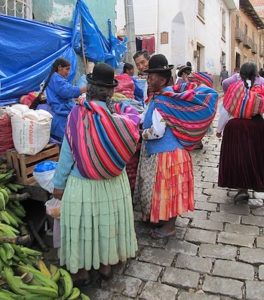
*Afro Bolivians are celebrated on this date in 1500. They are Bolivian people of Sub-Saharan African heritage in South America. They are descendants of Black slaves brought to the Americas via the Middle Passage.
"Afro Bolivian" also refers to Bolivia's historical or cultural elements originating from their community. It can also refer to the combination of African and other cultural aspects in Bolivian society, such as religion, music, language, the arts, and class culture. Afro Bolivians are recognized as one of Bolivia's ethnic groups by the country's government. They are ceremonially led by a king who traces his descent back to a line of monarchs who reigned in Africa during the medieval period. They numbered 23,330, according to the 2012 census.
In 1544, the Spanish Conquistadors discovered the silver mines in a city called Potosí, on the base of Cerro Rico. They began to enslave the natives as workers in the mines. However, the natives' health in the mines became very poor, so the Spanish started to bring African slaves to work in the mines. During the 17th century, 30,000 Africans were brought to work, though more expensive. In Bolivia, the cost was upwards of 800 pesos. This was because they were bought from eastern slave ports and had to trek from cities like Cartagena, Montevideo, and Buenos Aires to Bolivia. Slaves were put to work under challenging conditions; some survived no more than a few months, and we're not used to working at such a high altitude.
Many of these Native and African workers' lives were cut short because of the toxic smelter fumes and mercury vapors they inhaled while working in the mines. Slaves worked in the mines for four months on average. Also, they had to be blindfolded upon leaving the mines to protect their eyes, which had adapted to darkness. Although a requirement for Natives and Africans over 18 years of age to work in the mines for 12-hour shifts, younger children work in the mines. These children worked fewer hours but were still exposed to asbestos, toxic gases, cave-ins, and explosions.
It is estimated that as many as eight million Africans and Natives died from working the mines between 1545 and 1825, the end of the colonial period. Many newly brought slaves died due to harsh conditions and weather. The Spaniards fortified the slaves against the conditions by providing them with coca leaves to chew. Chewing coca leaves numbed their senses to the cold and dampened the feeling of hunger, relieving altitude sickness.
Like the mines of Potosí, coca plantations became a cash crop of the region. Thousands of slaves were shipped to cultivate and process coca leaves on Haciendas, like the ancestors of Julio Pinedo. A cocoa plantation in the Yungas region of Bolivia in 1924 was historically cultivated using African slave labor. Although these Afro Bolivians were free, they still had difficulty maintaining their culture. Many elements of their culture began to disappear and become endangered. They had to fight strongly against the colonial aggression and exclusion of their post-emancipation culture. Aspects such as feasts, their creole language (that has since been decreolized), and religion that survived through colonialism have since gone extinct, culturally, although fragments remain. Due to isolation from much of Bolivia, Afro Bolivians speak a dialect of Bolivian Spanish, akin to Black English in the United States.

In addition to being Roman Catholic, Afro Bolivians incorporate elements of African diasporic religions, such as rituals in the Macumba and Voodoo religions that have influenced their practice of Christianity, mainly prevalent in the towns of Chicaloma and Mururata. One of the ways that they were able to hold on to this culture was through their music and dance. Musical traditions such as dances, instruments, and techniques, with ancestral origin in Sub-Saharan Africa, define Afro Bolivian identity to the present day. It has been estimated that 25,000 Afro Bolivians live in the Yungas. They are proud of their culture and have fought hard to preserve it. In fact, in Mururata, the Afro-Bolivians maintained their traditional culture and a continuous Afro Bolivian monarchy, which Julio Pinedo led.
Afro Bolivians spread to the east in Cochabamba and Santa Cruz de la Sierra. Despite the Afro Bolivian community working to preserve their culture, they experienced racism, isolation, and intolerance. Laws that criminalize racism and discrimination in Afro Bolivia have slowly been ratified as the first anti-discriminatory law (law 45) was passed in 2010 and was met with violent protesting and rioting. In 2009, President Evo Morales added amendments to the national constitution that outlined the rights of Afro Bolivians and guaranteed the protection of such liberties. The amendments also generally extended to indigenous peoples and officially recognized Afro-Bolivians as a minority group in Bolivia despite not being included in the national census three years later.
In addition to the country's constitution being updated in 2009, President Morales created the Vice Ministry for Decolonization to create policies that criminalize racism while working to improve literacy and create better race relations in Bolivia. The Vice Ministry for Decolonization also works to dismantle colorism and racism influenced by European colonization while also promoting the philosophy of "interculturality," in which citizens of the nation recognize every ethnic group’s tradition and cultural practices as contributions to society.